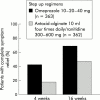Approaches to uninvestigated dyspepsia
- PMID: 11953347
- PMCID: PMC1867704
- DOI: 10.1136/gut.50.suppl_4.iv42
Approaches to uninvestigated dyspepsia
Abstract
Uninvestigated dyspepsia refers to patients with new or recurrent dyspeptic symptoms in whom no investigations have previously been undertaken. These patients are much more likely to present in primary than in secondary care. It is particularly important to be able to offer effective symptom relief to support the explanation, reassurance, and advice provided to patients, and low dose or standard dose proton pump inhibitor therapy appears to offer the most effective approach to empirical therapy of this kind.
Figures




References
Publication types
MeSH terms
Substances
LinkOut - more resources
Full Text Sources
Medical
